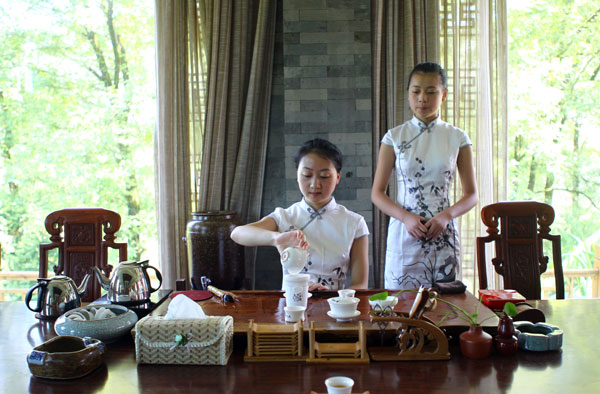Farmers brew up wealth with native cup of tea
 |
|
Staff members of a tea company perform at a tea ceremony. [Photo by Zou Hong / China Daily] |
The city of tea
Wuyishan can be regarded as a large tea-themed tourist park. The shops sport different decorations, but every one contains a large wooden table, complete with a teapot and a set of cups ready for brewing the beverage.
Hailed as the "King of Chinese Tea", Dahongpao has been grown for centuries on the rugged Wuyi Mountain and was offered as a tribute or gift to the imperial courts in ancient times.
According to Ye Qitong, a well-known tea expert and master blender, many fascinating stories about Dahongpao add to the charm of this prestigious tea.
"One popular legend has it that during the Ming Dynasty (1368-1644), a young scholar on his way to the imperial civil examinations was laid low by abdominal pain and fainted in front of a temple on Wuyi Mountain. A monk treated him with tea grown on the mountainside," explained Ye.
Cured by the tea, the scholar continued his journey and took first place in the exam.
Returning to the mountain as a high-ranking official, he expressed his gratitude by covering the tea tree with his new, flamboyant red court robe, and since then the tea has been called Dahongpao, explained Ye.
Another anecdote that highlights the value of Dahongpao occurred in 1972, when then-US president Richard Nixon made his historic visit to China.
During the visit, Nixon was presented with 200 grams of Dahongpao tea by Chairman Mao Zedong. However, the amount was so small that Nixon thought the gift trivial.
Sensing Nixon's doubt, Zhou Enlai, China's premier at the time, explained that the total annual yield of the six mother trees, which have survived for hundreds of years, was a mere 400 grams and joked that the chairman had already given him "half of the country".
Retaining its status as a premium gift, the tea boasts a high market price. In 2002, 20 grams sold for a record 180,000 yuan at an auction in Guangzhou, Guangdong province.

























